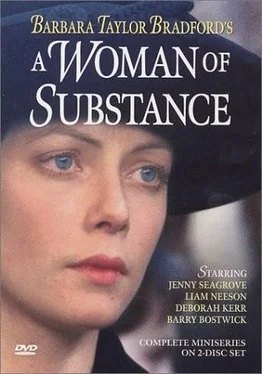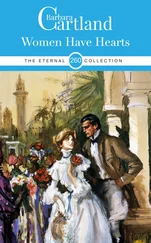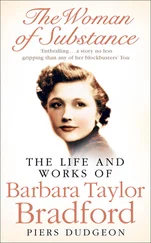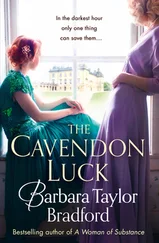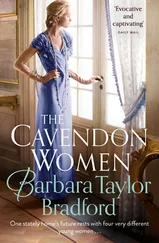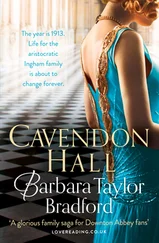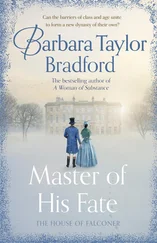Always drawn to Emma during her marriage to Joe Lowther, he had pursued her unavailingly for months after his return from the war. Then unexpectedly, at Blackie O’Neill’s on Boxing Day night of 1919, she had seemed to thaw towards him and, being exceedingly opportunistic, Arthur had pressed his suit with a rare show of determination in the new year, egged on by his ambitious parents. After a whirlwind courtship of three months they had been married in the spring of 1920.
Arthur had believed that Emma was as smitten with him as he was with her, his vanity not permitting him to think otherwise. In all truth, Emma had married him for wholly different reasons. The terrible implications of Paul McGill’s silence and continuing absence from England had devastated her and her anguish had become too painful to bear. Her increasing loneliness had prompted her to reassess her life. Plain common sense had led her to conclude that there was no future for her with Paul, and she acknowledged that to yearn for him was not only foolish but inevitably self-destructive. She tried to put Paul out of her mind completely, deciding that she must lead a more normal life for her children’s sake as well as her own. Convinced that she would never again experience the same kind of sublime love she had had with Paul, she sought instead a companion, a man who was easy to be with. She also wanted a father for her children and a suitable male head for her household. In short, she was prepared to compromise, to settle for less out of necessity and in the belief that great love was not always a prerequisite for a happy marriage.
At first amused by Arthur’s most transparent and eager overtures, Emma had come to view him as the perfect solution to her problems. He was a gentleman and came from a good family. He also had charm and handled himself with a degree of elegance in all situations. He was amusing, attentive to her needs, and enamoured with her. Furthermore, Emma liked beauty and had strong aesthetic instincts, and she found Arthur attractive. If he aroused no great passion in her, he likewise did not repulse her, and she had decided she could easily tolerate the physical aspects married love entailed, concluding that other factors in their relationship were of more vital consideration to her. Emma knew Arthur was weak, yet curiously she turned a blind eye to faults in his character for several fundamental reasons: Arthur did not threaten her; she recognized that he would never interfere with her business or the manner in which she led her life; she instinctively knew that she would always retain the upper hand. These reasons aside, he had a winning way with her children and treated them with a naturalness she appreciated.
Emma wanted to obliterate Paul McGill by involving herself in a new relationship. She was determined to marry quickly, and Arthur appeared to be the most suitable candidate on the horizon. Expedient by nature, she plunged ahead, seeking action and commitment in preference to waiting. Her unprecedented imprudence stunned her brothers and Blackie, who met such icy imperiousness when they tried to interfere they immediately retreated, recognizing it was fruitless to offer advice once she had made up her stubborn mind.
Ruefully Emma acknowledged her error after only a few weeks of marriage, but by then it was too late. She had conceived on their honeymoon. It had not taken her long to discover that Arthur’s charm was meretricious, and his wit often as cruel as it was entertaining. He was captious, and his shallowness and indolence appalled her. Also, his sexual appetite was as voracious as Joe Lowther’s had been although Arthur displayed more finesse and he did not induce physical revulsion in her. Nonetheless, Emma soon found their lovemaking burdensome because it was only Paul she loved and desired.
But she was honest enough to admit that she had made the mistake, and because she took her obligations seriously, Emma endeavoured to maintain a civilized front and simulated passion whenever necessary. In the beginning the union was relatively tranquil, mostly due to Emma’s expert dissembling. Arthur, unaware of her feelings, was euphoric at his good fortune in winning this beautiful, accomplished young woman, and he basked in Emma’s prestige and enjoyed the privileges that came with her money. He was, for the most part, considerate and acquiescent. Unhappily, after the twins, Robin and Elizabeth, were born in 1921 he grew careless and offhand with Emma, confident that his marriage was secure now that he had fathered two children by her, and convinced of her devotion to him.
During Emma’s confinement, Arthur had taken to amorous adventuring, and having acquired a taste of the excitement inherent in illicit relationships, he found them increasingly impossible to forgo. Then when he and Emma resumed their marital intimacy, he was unable to fire up his ardour sufficiently for effective consummation. After several disastrous experiences Arthur had retreated into his own room. To his relief Emma never questioned his absence from her bed. In his vanity he ascribed this to her preoccupation with her business, the children, the demands of a large household, and her nervousness about becoming pregnant again so soon after the birth of the twins. It never occurred to him that she loved another man, and as the months passed his complacency increased, as did his arrogance.
As Arthur contemplated his appearance, Emma climbed out of the bath and dried herself briskly. She stood for a moment in front of one of the mirrored panels, gazing at her body with detached interest. Her full breasts were high and firm, her thighs gently rounded, her stomach flat. She had kept her figure; considering she would be thirty-four next month, and had borne four children, she looked amazingly youthful. There was nothing matronly about her shape, thanks to her busy schedule and her singular distaste for rich foods that sprang from the deprivations of her spartan childhood. Turning away, she put on the silk robe and padded into the bedroom.
Seating herself at the dressing table, Emma picked up a silver monogrammed hairbrush, her head held on one side. She was delighted she had decided to cut off all her hair last week. She liked this new bob that was all the rage. The style suited her and was absolutely perfect with her new haute couture clothes from Vionnet and Chanel. There was a sudden loud knock and Emma swung around as Arthur strode in. Emma stared at her husband, surprised by his unexpected appearance. She pulled the robe around her swiftly and suppressed a stab of impatience, resenting the intrusion. She was finding it increasingly difficult to maintain a cordial front with him these days.
‘Really, Arthur, you quite startled me.’
‘Did I just!’
Emma’s eyes lighted on the drink in his hand. ‘You’re starting a bit early, aren’t you?’ she said, striving to hide her annoyance.
‘For God’s sake, don’t start that again!’ he cried, walking over to the yellow velvet sofa. He draped himself on it and threw her a scathing look. ‘You can be such a crashing bore, my dear. A real killjoy, as a matter of fact.’
Emma sighed, recognizing his mood. ‘We are facing a long evening, Arthur. I don’t want you to-’
‘Get drunk and disgrace you, my pet,’ Arthur interjected. ‘Emma must never be upset. God forbid that should happen,’ he snapped with a flash of arrogance. ‘What am I supposed to do all evening? Tread in the Queen’s shadow?’
Ignoring the jibe, Emma turned to the dressing table and picked up a bottle of Guerlain’s L’Heure Bleu. She dabbed the crystal stopper behind her ears and, not wanting to provoke a quarrel, she changed the subject. ‘I had a sweet letter from Kit today. He sends his love. He’s enjoying school. I’m so glad I sent him to Rugby. He’s in his element.’
Читать дальше
Конец ознакомительного отрывка
Купить книгу
